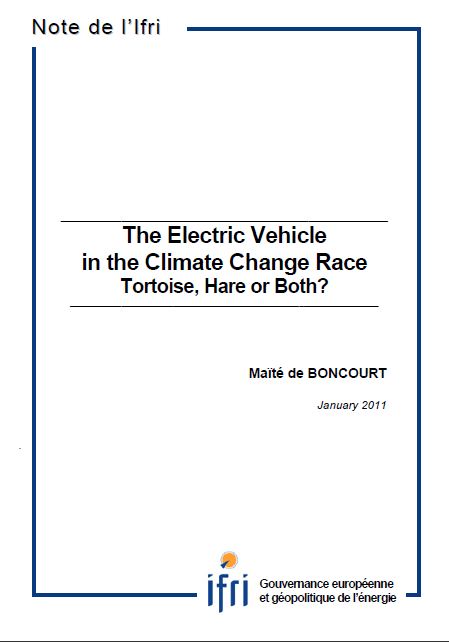The Electric Vehicle in the Climate Change Race: Tortoise, Hare or Both?

Europe is seeking ways to decrease the growing negative impact of passenger cars on climate, currently responsible for up to 12% of total EU CO2 emissions. After biofuels in the nineties and hydrogen in 2000, the new answer to climate change appears to be electric. But contrary to many marketing messages, electric cars are not zero emissions cars. They will not necessarily contribute to actual CO2 emission reductions before 2020 and even then, not in every country.
In EU Member States where the power sector is based on coal, they could actually make things worse. In others, bad management of the charging function could increase peak load requirements and cause investments in fossil-fuel-fired power plants. Finally, electric vehicles and related costs are very high. Not only does this cast doubts on the extent and timing of their eventual market breakthrough, but it may also mean that their CO2 tone abatement cost is high.
Nonetheless, for the longer term, CO2 emissions from conventional vehicles can only be reduced to a certain extent whereas the potential for electric vehicles plugged into a decarbonised electricity grid approaches zero. If electric cars are to help to reduce CO2 emissions significantly in the future, Europe needs to start now to develop this promising mitigation tool. There is in theory almost no constraint on the electric vehicle becoming a “zero emission vehicle”, while conventional car will always have to burn fuel.

Available in:
Regions and themes
ISBN / ISSN
Share
Download the full analysis
This page contains only a summary of our work. If you would like to have access to all the information from our research on the subject, you can download the full version in PDF format.
The Electric Vehicle in the Climate Change Race: Tortoise, Hare or Both?
Related centers and programs
Discover our other research centers and programsFind out more
Discover all our analysesAI, Data Centers and Energy Demand: Reassessing and Exploring the Trends
The information and communication technologies sector today accounts for 9% of global electricity consumption, data centers for 1-1.3%, and artificial intelligence (AI) for less than 0.2%. The growing energy demands of cloud services first, and now AI workloads (10% of today’s data centers electricity demand), have exacerbated this trend. In the future, hyperscale data centers will gain shares amongst all kinds of data centers and AI will probably account for around 20% of data centers electricity demand by 2030.
Unlocking India’s Energy Transition: Addressing Grid Flexibility Challenges and Solutions
India is rapidly scaling up its renewable energy (RE) capacity, adding 15–20 GW annually, but the ambitious goal of 500 GW of non-fossil capacity by 2030 is at risk unless the pace accelerates.
Europe’s Black Mass Evasion: From Black Box to Strategic Recycling
EV batteries recycling is a building block for boosting the European Union (EU)’s strategic autonomy in the field of critical raw minerals (CRM) value chains. Yet, recent evolutions in the European EV value chain, marked by cancellations or postponements of projects, are raising the alarm on the prospects of the battery recycling industry in Europe.

The New Geopolitics of Energy
Following the dramatic floods in Valencia, and as COP29 opens in Baku, climate change is forcing us to closely reexamine the pace—and the stumbling blocks—of the energy transition.








